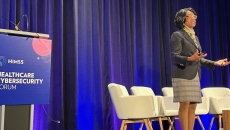Quality and Safety
The CIO of Penn Medicine says 2023 will be another year of significant change, requiring organizations to display nimbleness and teamwork to execute their strategic plans.
Grace Chang, cofounder and CEO of Kintsugi, explains how clinicians can identify signs of clinical depression and anxiety in everyday health conversations with the use of voice biomarker technology and machine learning assessments.
But "hard work continues, as we persist in pressing telehealth permanency and creating a lasting roadblock to the telehealth cliff," the group said.
A new KLAS report examines which PM vendors best deliver on customers’ expectations for midsize and large practices, and for independent and owned practices, with athenaIDX, Epic and NextGen receiving high marks.
The study of 35 million telehealth visits found that most patients did not require in-person visits within 90 days of online appointments, indicating virtual visits as an effective "alternative, rather than duplicative" care modality.
Resource constraints and inefficient manual processes are burdening cancer centers across the U.S., but a new report shows how machine learning capabilities outside of EHRs could help improve agility.
The American Hospital Association is calling for greater federal support for victims of cyberterrorism to help get hospitals back online quickly. It also advises hospitals to coordinate cyber response with their regional emergency planning efforts.
Ed Gaudet, CEO and founder of Censinet, says collaboration is key as organized crime shakes down healthcare – resulting in dangerous diversions of care, patient data compromise and loss of resources.
Healthcare organizations can streamline the vendor management process to reduce third-party risk, while they build a culture of resilience.
At the 2022 HIMSS Healthcare Cybersecurity Forum in Boston, keynote speaker Anita Allen described the delicate and complex balance between the imperative of data sharing and the need to protect privacy.








